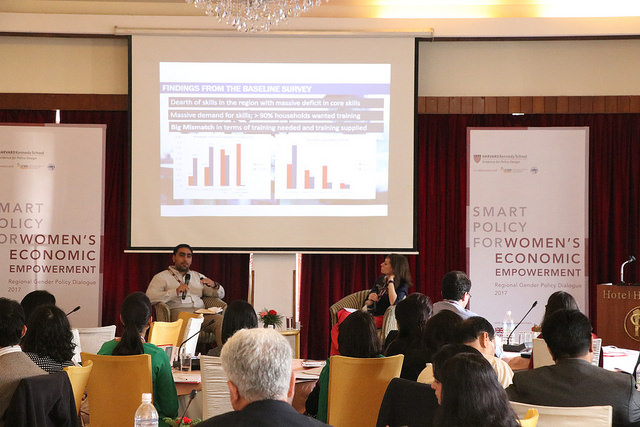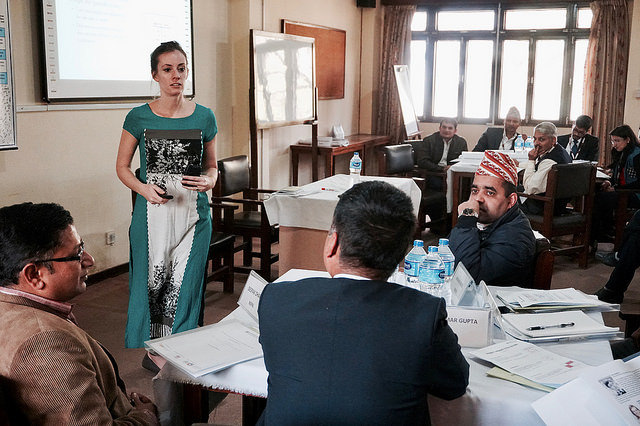
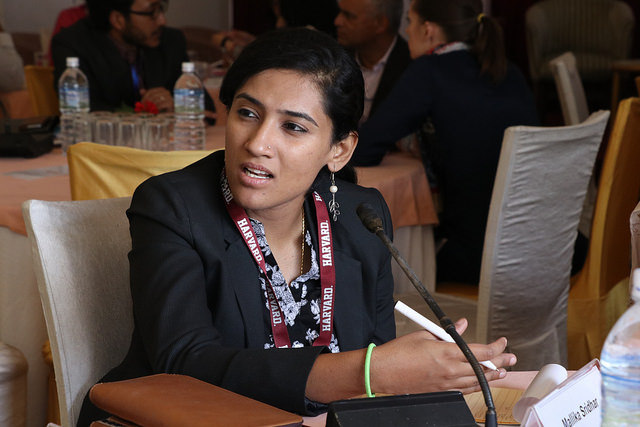
Originally published by Evidence for Policy Design, March 23, 2017.
Teams from Evidence for Policy Design conducted a series of complementary activities in Kathmandu in March to advance the use of data and research evidence in policymaking across South Asia. The activities were part of EPoD's Building Capacity to Use Research Evidence (BCURE) program, funded with UK aid from the UK government.
Read an interview with Rohini Pande and Michael Callen on EPoD’s activities in Nepal:
“Transparent policymaking makes people less cynical of their government.”
"Training of Trainers" 15 - 17 March
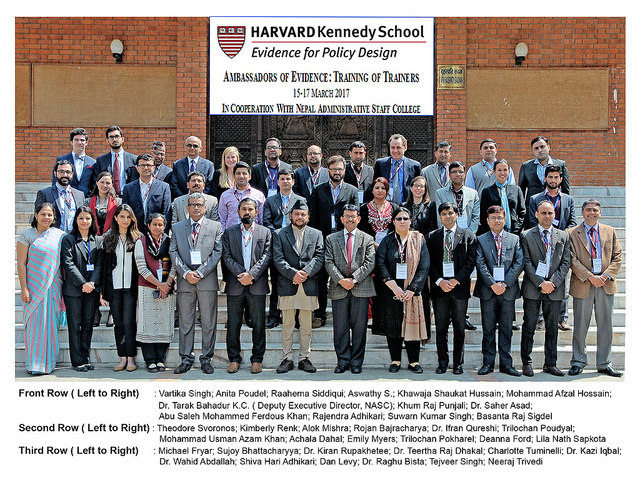
Policy will citizens better when policymakers believe in evidence and know how to use it. Based on this belief, EPoD has developed a scalable model for instilling an appreciation of evidence and skills for its use among civil servants in South Asia and beyond.
- Through the BCURE program, we have created six blended online/classroom learning modules on topics such as cost-benefit analysis, aggregating evidence, and commissioning evidence.
- We deployed this course across South Asia, customizing each iteration to include case studies relevant to trainees’ context, and creating a tailored in-classroom experience by incorporating their responses to real-time course questions and demonstrated understanding of various concepts into the teaching.
- Now we are training trainers who will deliver the BCURE modules to local leaders and civil servants going forward. In particular, we have embedded BCURE trainings into the high-level civil service training academies in Pakistan and India.
In Kathmandu, our training team worked with our host, the Nepal Administrative Staff College, to teach instructors from Bangladesh, India, Nepal, and Pakistan – along with civil servants who previously had gone through the BCURE training – to implement the blended-learning modules.
BCURE training, 20 - 23 March
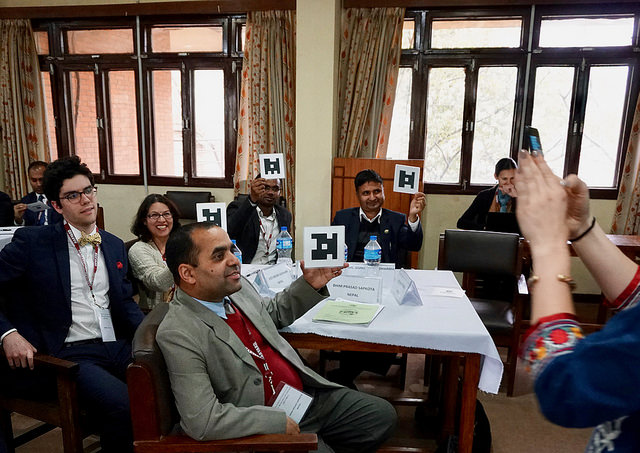
The second program in Kathmandu was a BCURE training for civil servants making policy decisions on a daily basis. Forty civil servants from the Bangladesh Ministry of Finance, and from several of Nepal’s ministries (including Education; Women, Children and Social Welfare; and the National Reconstruction Authority) participated in the training. The trainees learned principles of policy evaluation and data analysis to help them better interpret and apply evidence relevant to policy formulation and program implementation.
For the Nepal training, we incorporated a case study on EPoD’s policy-research collaboration with the National Reconstruction Authority, where we are using data to make relocation of at-risk communities work better for citizens. By drawing on an ongoing pilot project in Nepal, we were able to provide real-life examples of how the course learnings can be applied in practice.
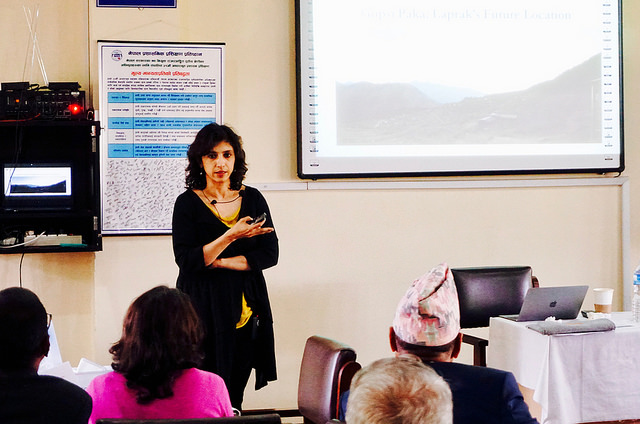
Policy Dialogue: Smart Policy for Women's Economic Empowerment, 23 - 24 March
The activities culminated in a public program on 23 March featuring leaders, policymakers, and researchers from across South Asia.
Headlining the event were:
- Shirin Sharmin Chaudhury, Speaker of Parliament for Bangladesh, who spoke on issues of women's empowerment around the globe.
- Sapana Pradhan Malla, Jurist before the Supreme Court of Nepal, who described how the law can be used to achieve gender equity.
- Swarnim Waglé, a member of the National Planning Commission of Nepal and co-author of the 2013 United Nations Human Development Report (HDR), who gave an update on the newly released 2016 HDR.
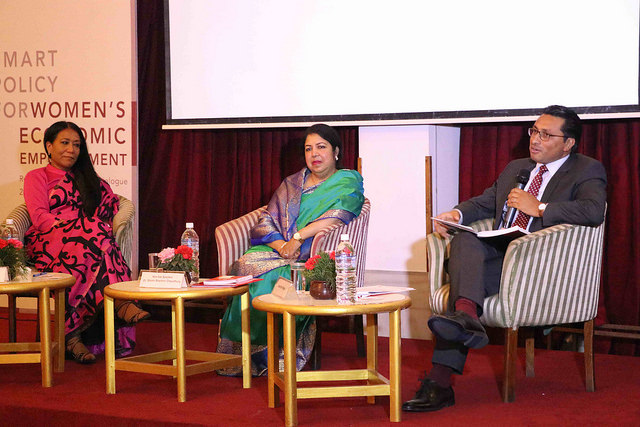
Watch Sapana Pradhan Malla describe the 12-year struggle for women’s inheritance rights in Nepal.
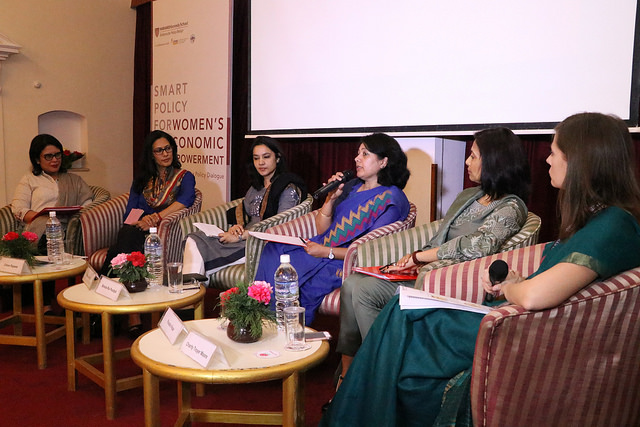
In a panel discussion, policymakers and researchers from Nepal, India, Bangladesh, and Pakistan spoke about women’s participation in the workforce, and the policies that can best promote inclusion.
In order to build public interest in evidence-based policy and share insights from the latest research, EPoD collaborated with in-country media outlets on a series of articles describing the issues and insights covered in the Policy Dialogue:
- What can South Asian countries learn from each other? EPoD’s Charity Troyer Moore and Vestal McIntyre
- Women’s prosperity versus their “Time Poverty”. EPoD’s Vestal McIntyre
- Women’s inheritance law in Bangladesh and across South Asia. Dialogue speaker Rubana Huq and EPoD’s Vestal McIntyre
Day 2 of the Policy Dialogue included a session where EPoD-affiliated researchers and staff introduced leaders of gender policy in South Asia to the Smart Policy Design & Implementation model, or SPDI, an iterative framework for applying evidence to all stages of the policy-research cycle.
Smart Policy Design and Implementation (SPDI) relies on economic theory and empirical analysis to identify policy-relevant research questions, diagnose potential underlying problems, and test and improve upon potential policy solutions. In small groups, the participants applied the SPDI framework to real-world issues of women’s economic empowerment, and then presented their findings to the meeting at large.
